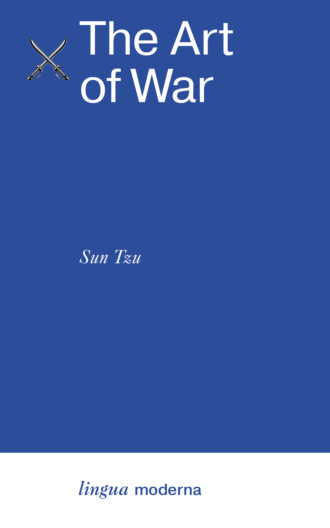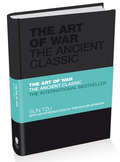
Сунь-цзы
The Art of War
© ООО «Издательство АСТ», 2023
Introduction
I
Written in the fifth century, Suntzu and Wutzu still remain the most celebrated works on war in the literature of China. While the chariot has gone, and weapons have changed, these ancient masters have held their own, since they deal chiefly with the fundamental principles of war, with the influence of politics and human nature on military operations; and they show in a most striking way how unchanging these principles are.
When these books were written, China was a conglomerate of principalities in continual ferment. Personal ambition and intrigue, and not the wishes of the people, were the main factors in these wars. Patriotism, or a popular cause, could not, therefore, be relied on to maintain the moral of the levies. Instead of these, what may be called the force of despair is pointed out as the most powerful agent in giving cohesion and energy to an army. The general is urged to take a vigorous offensive; and to act at a distance from his base, where defeat means disaster, and where desertion is minimised owing to the distance from home. He should, in fact, burn his boats before an action, or, in Chinese phrase, act as one who removes the ladder from under those mounted upon the roof.
On the other hand, every care must be taken not to render the enemy desperate; and, as an instance of this, Sun observes that an opponent should on no account be completely surrounded. A loop-hole of escape weakens the resolution of the general and the energy of his troops.
It is interesting to notice that moral, or the spirit of the troops, is thus considered a determining factor in war. The Chinese are perhaps unusually affected by climatic conditions. As is well known, the umbrella was part of a soldier’s equipment; and for the same reasons, the sunny side of high ground is recommended as most suitable for defence, tactical considerations permitting.
The large number of bannermen in the Chinese army was out of all proportion to the service of standards in providing rallying points. The chief use of banners was to maintain the spirit of the troops. A forest of banners, held erect, gave a feeling of liveliness and security to the ranks, in the same way as a military band, and when Sun remarks that the march of an army should be calm like the forest, he is using a simile that is not inappropriate.
Probably owing to the fact that the profession of arms has never been highly regarded in China, we find that the ruler of the state did not usually take the field, but employed a professional to command the army-one of the masters of war who wandered from state to state at that time with the secrets of victory to impart to the highest bidder. The question of political interference with the general in the field naturally arises under these conditions. The two sages point out, that to unite the nation under firm and just government is the business of the ruler and necessary to victory; but that the general is the best judge of the questions that arise on a distant field, and that all interference with him causes delay and disaster.
War meaning ravage, it was essential that the operations should be conducted in the enemy’s territory. Once there, however, a vigorous offensive is no longer advised. “At first behave with the discretion of a maiden” is the counsel of Sun. The enemy must be induced to take the initiative, and when he is worn out by marching, or makes a false move, “then,” says the master, “dart in like a rabbit.”
Unlike the tactics of the Japanese, in whom the spirit of attack burns so strongly, those of Suntzu and Wutzu are essentially of the offensive-defensive order-manœuvre before fighting, and non-committal until the enemy has shown his hand. The business of the general is to avoid encounter in battle until the enemy is no longer capable of offering a successful resistance.
The masters do not make, however, the mistake of advocating a passive defensive. Suntzu lays down that the division of the forces which this strategy involves, is to be everywhere weak, rendering the army liable to be taken in detail by the concentrated forces of the enemy. It is rather the defence which avoids battle by mobility and manœuvre, induces the enemy by stratagem to divide his forces, or act in conformity with our wishes, and then falls upon him.
With regard to the tactics of the battlefield, the pitched battle, or, in other words, the frontal attack, is considered unworthy of the skilful general. The plan of attack should consist, broadly speaking, in the division of the army into two forces. The enemy is “attracted and engaged by one force, and defeated with the other;” and here we have the containing or secondary attack, and the main or reserve force which decides the battle of to-day-a most striking instance of the continuity of military principles.
Considerable space is devoted to the influence of ground on war. The passage of defiles and rivers is still conducted in the same way. The many large rivers of China naturally affected military operations; and, among other axioms, it is laid down that the passage of a river should not be disputed, as the enemy will probably give up the attempt, and make the passage untouched at some other point, but that he should be attacked when half his force is across the stream. Again, an army should not encamp on a river below the enemy, as it is thereby liable to be inundated, or to have its water poisoned; or the enemy may come down stream and make a sudden attack.
While both writers were professional soldiers, they show a fine disinterestedness by repeatedly pointing out that even successful war brings evil in its train. Wu remarks that “few are those who have gained power on earth by many victories,” and he is insistent that war should not be undertaken until a careful comparison of the two sides shows that victory is certain; and he adds, “The army which conquers makes certain of victory and then attacks, while the army that is defeated fights in the hope of success.”
Hence the importance they assign to intelligence of the enemy, and to the spy; and as the sages dealt with war between members of the same race, the work of spies was greatly facilitated. The spy was treated with great honour by his countrymen, and the fact that many of the national heroes of China were spies, shows that the part that they played was not forgotten. They frequently toiled for years, and rose to high rank in the enemy’s service; and thus, by wrong counsel and by spreading mistrust in his ranks, they became a two-edged sword in the hands of the general. “Wonderful, indeed, is their power,” exclaims Sun; but he also reminds us that their management is the most difficult and delicate duty of the general.



